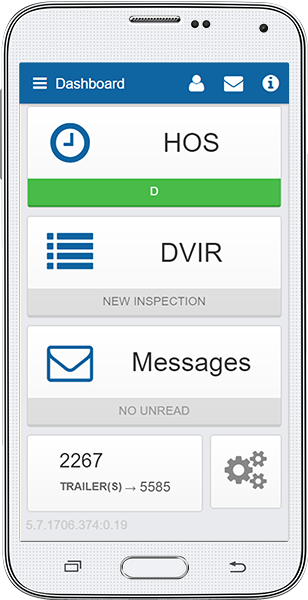Electronic logging devices, also known as e-logs, aren’t optional.
Since December 16, 2019, the Federal Motor Carrier Safety Administration (FMCSA) Electronic Logging Device (ELD) has required every commercial vehicle required to keep a Record of Duty Service (RODS) to keep it electronically. Every driver of a vehicle covered by the law (we’ll have more to say about that a little later) is already required to use an electronic logging device.
Most fleet operators have already discovered that electronic logging devices drastically reduce paperwork. They enable the seamless transmission of RODS and hours of duty from operators to dispatch without errors. They integrate RODS with the carrier’s management systems.
But seamless recording is only possible when the e-logging device comes from a reliable provider. GPS Technologies has the selection of devices and the experience in the industry to provide your company with completely reliable, fully integrated electronic logging devices.
What Kinds of Data Are Recorded by Electronic Logging Devices?
Federally mandated electronic devices record date, time, location, odometer readings, engine hours, and events. There will be an entry for down time, when the vehicle is off duty, for time the operator is on duty but not driving (ODND), and for powering up, syncing the engine, drive time, and arrivals. Embedded in the daily record will be the operator’s driver license number, the electronic logging device ID, the trailer ID, the driver’s name, the driver’s ID number, any co-driver information, a record of electronic logging device malfunction indicators, the name of the carrier, the starting and ending odometer readings, a calculation of miles traveled, the vehicle’s VIN number, the driver’s RODS status (exempt or non-exempt), starting and ending engine hours, and the vehicle’s current location.

Is My Company Required to Use Electronic Logging Devices?
Chances are that if your company is required to use e-logging, you already know, but some companies that are considering expanding their operations across state lines may benefit from a refresher on the rules.
Truck drivers and delivery drivers who are required to keep a RODS must keep it electronically. Only drivers involved in interstate commerce are required to keep RODS.
E-logs are also required for vehicles used in interstate commerce that:
- Weight 10,001 pounds or more.
- Have a GCWR (gross combination weight rating) or GCVR (gross combination vehicle rating) of 10,001 pounds or more.
- Transport 16 passengers or more, including the driver, for a non-profit purpose.
- Transport nine passengers or more, including the driver, for profit.
- Transport hazardous materials for which the vehicle is required to display a placard.
If any one of these conditions applies to the vehicle, then there must be a 24-hour e-log on the vehicle, although some exceptions apply.
- An outside salesperson who spends less than 40 hours a week behind the wheel is not required to use electronic logging.
- A short-haul driver with a CDL who operates within a 100-mile radius of where they normally report for work is not required to use electronic logging.
- A driver who does not have a CDL is not required to use electronic logging if they operate within a 150-mile radius of where they normally report for work.
- Carriers of oilfield equipment are not required to use electronic logging.
There is also a timecard exception.
There are different rules for operators who drive their vehicles 8 days or less in a 30-day period, or who operate tow trucks, or who drive vehicles manufactured before the year 2000.
These drivers can still meet their RODS requirements with a paper log. But even if they keep a paper log, they can be required to transcribe their paper log into a software program. This invites data entry errors and omissions.
Some Hard Copy Documents Are Still Required by Federal Law
Even when a driver uses an electronic logging device for GPS tracking systems, they are still required to keep an information packet onboard with them. This packet must include a user manual for the e-logging device. The user manual can be in electronic form. There must be an instruction sheet that describes how data is transferred from the device and the management software the electronic logging device supports. There must be an instruction sheet that tells the operator what to do when the device malfunctions, and there must be a supply of blank paper or RODS graph grids that the driver can use to record their information for eight days.
Fleet operators are required to keep RODS data and a backup for six months. The data and the backup can’t be on the same device. The electronic logging record must preserve the original log plus any edits. For example, a carrier might edit an operator’s record from “Off Duty” to “On Duty Not Driving.” The record needs to show that the driver accepted the change and why the change was made.

How GPS Technologies Can Help Your Company with Compliance
Making sure that electronic logs and electronic logging devices is a complex process. But there is one more requirement of the law that is hard for commercial carriers to keep up with.
It is not enough to keep all the records required by the Federal Motor Carrier Safety Administration. Carriers are also required to make sure their electronic logging devices are currently approved.
GPS Technologies keeps up with ever-changing device approvals. We can make sure that your company’s effort to abide by the rules counts by keeping your technology up to date.
GPS Technologies can help you track a single vehicle or manage a fleet of hundreds of vehicles. Contact us at (847) 382-5107 between 8 and 5 Central Time Monday through Friday with your questions or to get a bid.
